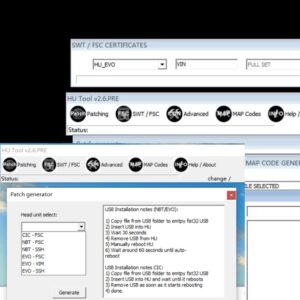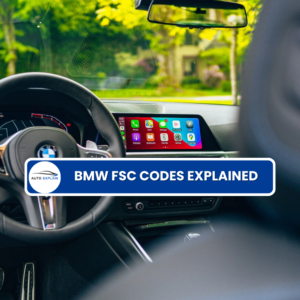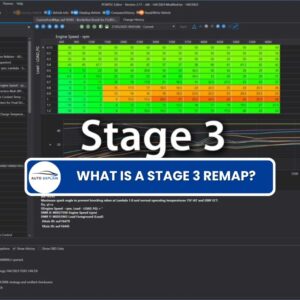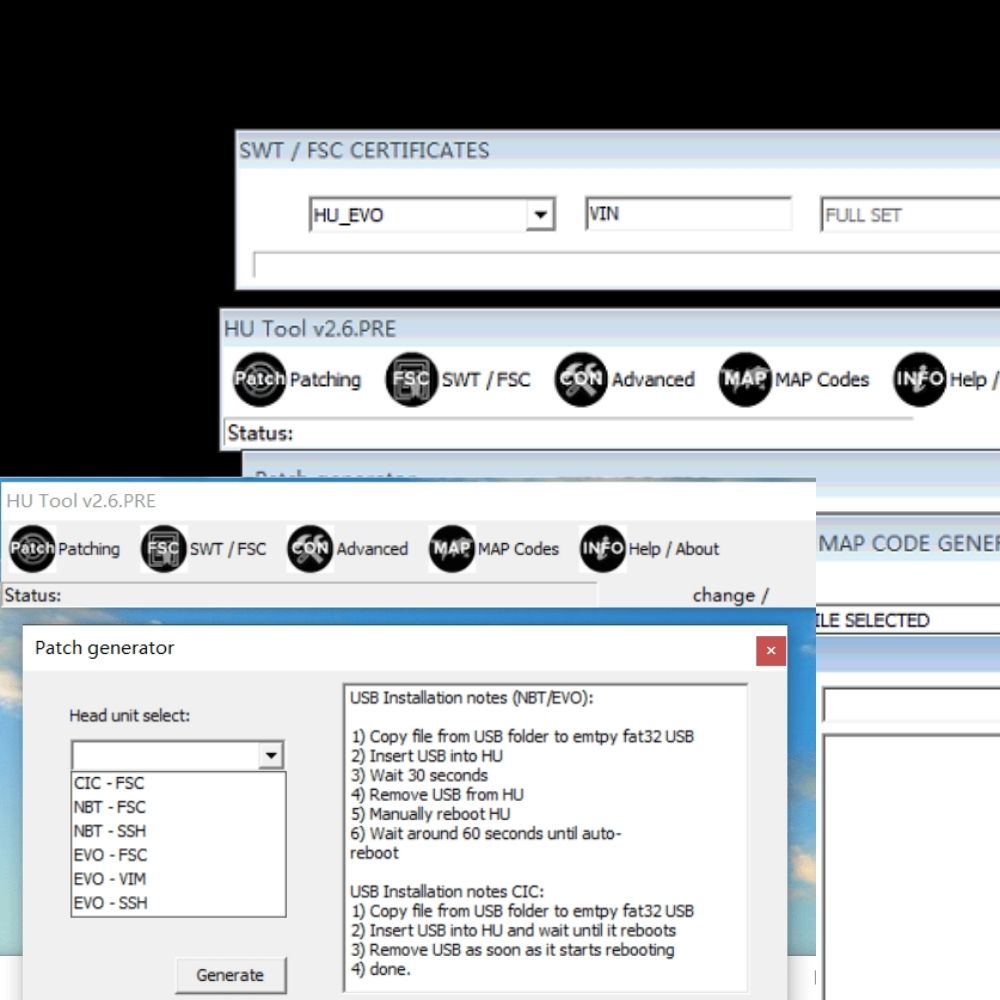
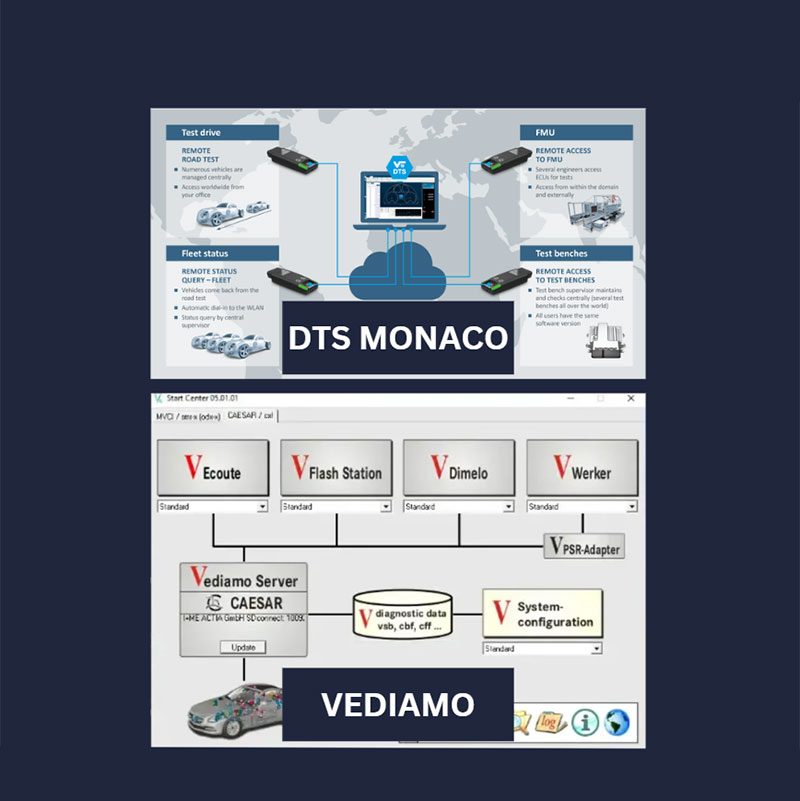
DTS Monaco vs Vediamo – What is the Differences?
When it comes to Mercedes-Benz coding, programming, and diagnostics, two of the most powerful tools available are DTS Monaco and Vediamo. Both software solutions are widely used by engineers and advanced technicians, but they serve different purposes and excel in different areas. In this article, we will compare DTS Monaco vs. Vediamo, examining their features, use cases, and key differences to help you choose the right tool for your needs.
Table of Contents
Toggle1. Overview of DTS Monaco and Vediamo
1.1. What is DTS Monaco Software?
DTS Monaco, which stands for Diagnostic Tool Set Monaco, is a sophisticated engineering software developed by Softing. It’s used extensively for in-depth diagnostics, ECU programming, and module testing within Daimler vehicles. Known for its ability to manage intricate vehicle systems, DTS Monaco is a crucial tool for both automotive manufacturers and advanced repair technicians.
DTS Monaco is the preferred choice for technicians and engineers working on newer Mercedes-Benz models (2017 and newer)
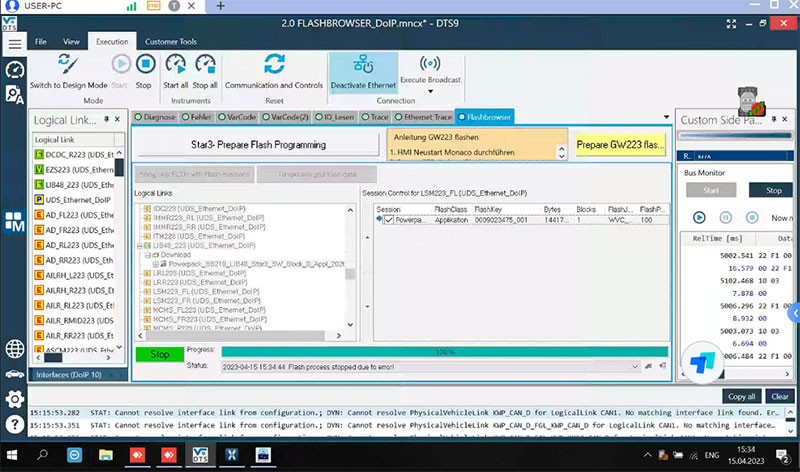
=> Click here to Download DTS Monaco
=> Click here to Learn How to Use DTS Monaco
Or you can see more DTS Monaco Tutorial Series:
1.1.1. Core Capabilities of DTS Monaco
- Extensive Diagnostics: Conduct thorough diagnostics across all vehicle control units, offering detailed insights into system health and potential issues.
- Advanced ECU Programming: Facilitates ECU flashing, coding, and parameterization, enabling updates and modifications to vehicle software.
- Customization Options: Allows users to develop personalized test sequences and scripts, enhancing diagnostic precision and efficiency.
- Real-Time Monitoring: Provides live data visualization and analysis, essential for identifying dynamic system behaviors and troubleshooting.
- Broad Compatibility: Designed for seamless integration with Mercedes-Benz vehicles and other Daimler brands, ensuring wide-ranging applicability.
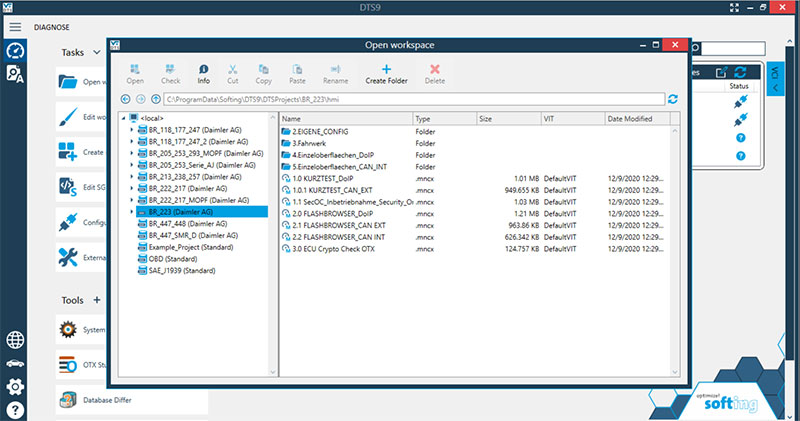
1.1.2. Practical Applications of DTS Monaco
- Engineering and fine-tuning of vehicle control systems to optimize performance and reliability.
- Pinpointing and resolving intricate vehicle malfunctions by leveraging advanced diagnostic capabilities.
- Executing software updates and coding for cutting-edge systems, including ADAS and powertrain components.
1.2. What is Vediamo Software
Vediamo is a specialized diagnostic tool tailored for engineering tasks within the Daimler group. Unlike DTS Monaco, Vediamo is more focused on programming and coding, making it a preferred choice for automotive professionals who need to modify vehicle features and configurations.
Vediamo is more suitable for technicians working on older Mercedes-Benz models (1999-2017)
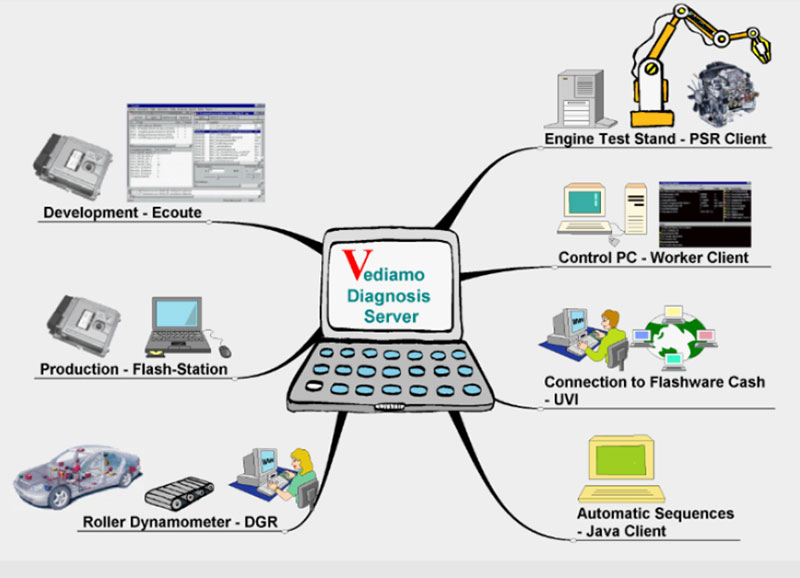
=> Click here to Download Vediamo Software
=> You may also like: How to Use Vediamo Software
1.2.1. Highlighted Features of Vediamo
- Offline Programming: Enables many programming functions without requiring an active internet connection, providing flexibility in various work environments.
- Direct ECU Access: Establishes direct communication with control units for efficient coding and parameter adjustments, ensuring precise modifications.
- Streamlined Interface: Features a user-friendly design focused on accelerating and simplifying programming tasks for increased productivity.
- Extensive Vehicle Coverage: Offers comprehensive support for older vehicle models and specific systems that might not be fully accessible via DTS Monaco, ensuring versatility.
1.2.1. Common Use Cases for Vediamo
- Performing retrofits and customizations to vehicle systems, tailoring functionalities to meet specific needs.
- Enabling or disabling distinct vehicle features, such as altering lighting configurations or security settings.
- Removing or activating component protection to facilitate component swapping or system upgrades.
2. DTS Monaco vs. Vediamo: Side-by-Side Comparison
Though both DTS Monaco and Vediamo serve similar functions—Mercedes ECU diagnostics, coding, and flashing—they are fundamentally different in terms of architecture, compatibility, and intended use. Let’s examine their differences across the most important dimensions:
2.1. Diagnostic File Formats and Project Structure
| Criteria | DTS Monaco | Vediamo |
|---|---|---|
| Primary File Types | .smr-d, .odx, .pdx, .otx |
.cbf, .cff, .cwf |
| Structure | Project-based with ECU layer mapping | ECU-based with individual CBF modules |
| Flash File Format | SMR-D/ODX2 | CFF |
| Metadata Access | Full metadata, signal descriptions, ECU layers | Minimal metadata, direct hex-level access |
Explanation:
DTS Monaco works with modern Daimler diagnostic architectures using ODX and SMR-D standards, where each ECU project includes structured layers, services, parameters, and variant options. It gives you high visibility into ECU architecture.
Vediamo, by contrast, accesses ECUs via CBF files, which contain command trees and variant coding blocks. Flashing is done through CFF files, which are firmware containers. It’s lightweight but lacks the detailed abstraction DTS Monaco offers.
2.2. Vehicle Model Compatibility
| Compatibility | DTS Monaco | Vediamo |
|---|---|---|
| Pre-2015 Vehicles (e.g. W204, W212, W221) | ✅ Supported | ✅ Best Fit |
| 2016–2020 Vehicles (e.g. W205, W222 facelift) | ✅ Recommended | ⚠️ Limited Support |
| 2020+ Models with DoIP (e.g. W223, X167, EQC) | ✅ Required | ❌ Not Supported |
| K-Line ECUs | ❌ Unsupported | ✅ Fully Supported |
Explanation:
DTS Monaco is designed for modern CAN-FD and DoIP-based communication used in newer Mercedes-Benz platforms. If you’re working on SMR-D-based vehicles like the W213 or newer, DTS Monaco is required.
Vediamo still performs well on older CAN/K-Line based systems and is commonly used for variant coding on legacy ECUs.
2.3. Communication Protocols and Interfaces
| Protocol | DTS Monaco | Vediamo |
|---|---|---|
| CAN | Yes | Yes |
| K-Line | No | Yes |
| DoIP (Diagnostics over IP) | Yes | No |
| UDS (Unified Diagnostic Services) | Yes | Yes |
| PassThru (J2534) Support | ⚠️ Partial | ⚠️ Partial |
| Best Interface | SDconnect C6 | SDconnect C4 |
Explanation:
DTS Monaco’s biggest advantage is its DoIP capability, crucial for late-model Mercedes vehicles with Ethernet-based ECUs. Vediamo, built on older Vector protocols, does not support DoIP and is thus incompatible with modern vehicle architectures. If you’re using a C6 VCI, DTS Monaco is your go-to. If you’re working with older SDconnect C4, Vediamo still works well.
2.4. Coding Capabilities
| Feature | DTS Monaco | Vediamo |
|---|---|---|
| Variant Coding | ✅ Full ODX/Layer-based | ✅ Hex/Binary-based |
| SCN Coding (Online) | ⚠️ Partial (manual or simulated) | ❌ Not available |
| Diagnostic Services Access | ✅ With service unlock | ✅ With seed-key |
| Parameterization | ✅ Parameter blocks & tables | ✅ Parameter groups |
| Automation of Coding Tasks | ✅ Via OTX Scripts | ⚠️ Basic Macros Only |
Explanation:
DTS Monaco offers structured variant coding, where coding changes are mapped through layers and metadata. It’s ideal for modern ECUs where variant dependencies are complex.
Vediamo provides a raw interface to variant options, allowing technicians to toggle bits directly. It’s quick but error-prone if you don’t fully understand the ECU logic.
2.5. ECU Flashing and Programming
| Feature | DTS Monaco | Vediamo |
|---|---|---|
| Flashing Support | ✅ Full (ODX2/SMR-D) | ✅ Full (CFF) |
| Flashing File Format | SMR-D / ODX2 | CFF / CWF |
| Flashing Speed | ✅ Faster on DoIP | ⚠️ Slower, CAN-only |
| Flash Integrity Checks | ✅ Metadata verified | ❌ Manual matching required |
| Flashing Modern ECUs (MRA/SBC+/Radar) | ✅ Required | ❌ Not Supported |
Explanation:
If you’re flashing modern modules like ADAS, MRA, SBC+, or Telematics, DTS Monaco is mandatory. It reads SMR-D dependencies and ensures file compatibility with your ECU. Vediamo still works on legacy modules but lacks the safeguards and ODX compliance that Monaco offers.
2.6. Scripting and Automation
| Function | DTS Monaco | Vediamo |
|---|---|---|
| Scripting Engine | ✅ OTX/XML with logic flow | ⚠️ Basic command macros |
| Test Automation | ✅ Yes (multi-ECU, sequence flow) | ❌ Manual only |
| Batch Flashing | ✅ Supported | ❌ Not supported |
| Logging and Debugging | ✅ Detailed trace logs | ⚠️ Basic logging only |
Explanation:
DTS Monaco is ideal for development engineers or advanced technicians who want to automate diagnostic tasks, run test sequences, or perform batch operations. Its scripting environment allows for reusable workflows, unlike Vediamo which is mostly manual and session-based.
2.7. User Interface and Learning Curve
| Feature | DTS Monaco | Vediamo |
|---|---|---|
| GUI Style | Modern dashboard, modular | Legacy-style, form-based |
| Learning Curve | ⚠️ Steep | ✅ Easier for beginners |
| Dashboard Customization | ✅ Graphs, tables, buttons | ❌ Basic view only |
| Multi-ECU Support | ✅ Simultaneous | ❌ One at a time |
| Training Resources | ⚠️ Limited online | ✅ Widely available (forums, videos) |
Explanation:
Vediamo is simpler and ideal for quick access to individual ECUs. DTS Monaco requires more knowledge but provides a powerful multi-ECU environment with real-time data visualization, advanced configuration, and dashboard programming.
2.8. Licensing, Installation & Software Availability
| Topic | DTS Monaco | Vediamo |
|---|---|---|
| Licensing Method | Softing license server | Dongle/license patch |
| Ease of Setup | ⚠️ Complex (license server, paths) | ✅ Easier setup |
| Project Files Availability | ⚠️ Limited (SMR-D must match VIN) | ✅ Many shared online |
| Clone Compatibility | Partial (some functions restricted) | ✅ Fully supported by most clones |
Explanation:
DTS Monaco licensing is more difficult to configure, and its SMR-D projects are VIN-specific, which makes file sharing harder. Vediamo has a more flexible ecosystem, especially for independent garages using SDconnect clones.
=> You may also like: Best Car Scanner for Mercedes Vehicle
3. DTS Monaco VS Vediamo: Which One Should You Choose?
If you are an advanced technician or engineer working with newer Mercedes-Benz models, DTS Monaco offers superior functionality, diagnostics, and programming options. However, if you mainly deal with older models and need a lightweight, fully offline tool, Vediamo is the better choice.
For professionals handling a wide range of Mercedes-Benz repairs and coding tasks, using both DTS Monaco and Vediamo together can provide a complete diagnostic and programming solution.
4. Learn DTS Monaco & Vediamo from A-Z
At AutoExplain, we not only provide technical insights but also offer comprehensive training materials for Mercedes-Benz technicians. We sell two essential books to help you master these tools:
- DTS Monaco Engineering: Comprehensive System Training – Covers everything from beginner to expert level, teaching you how to fully utilize DTS Monaco for diagnostics, coding, and programming.
- Vediamo Expert Techniques for Mercedes ECU Programming – A step-by-step guide on using Vediamo for ECU modifications, coding, and offline programming.
If you’re serious about Mercedes-Benz diagnostics and programming, these books will provide the structured knowledge you need.
Contact AutoExplain today for expert assistance:
WhatsApp: +1(936)2896695
Email: [email protected]
Website: AutoExplain

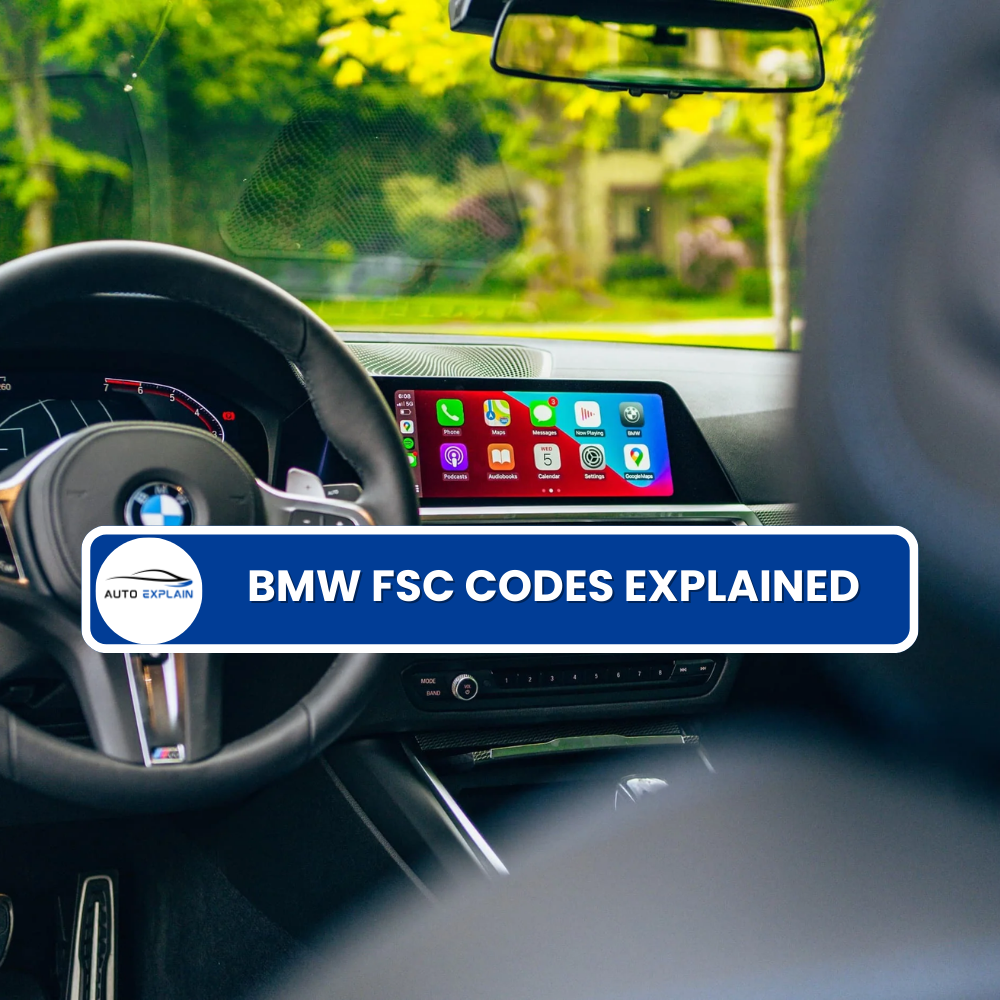
BMW FSC Codes Explained: Full FSC Code List for F-Series
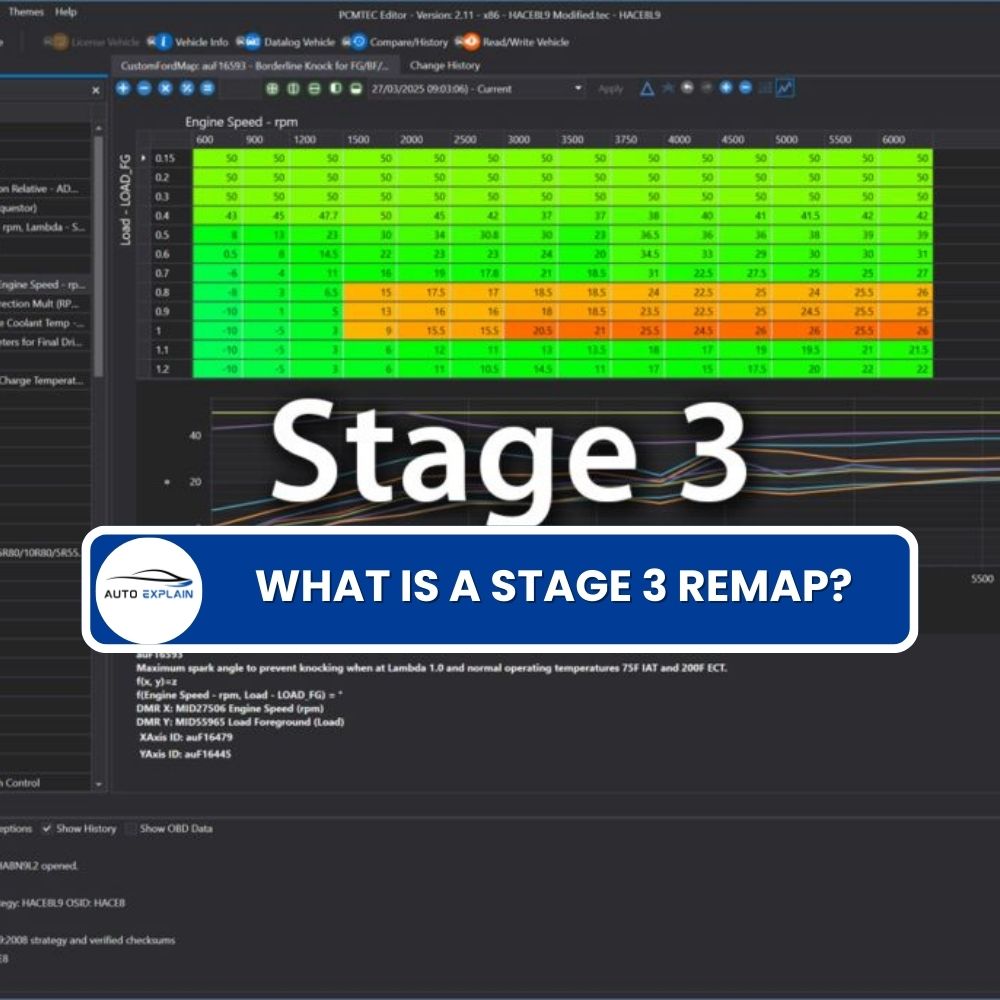
What is a Stage 3 Remap?
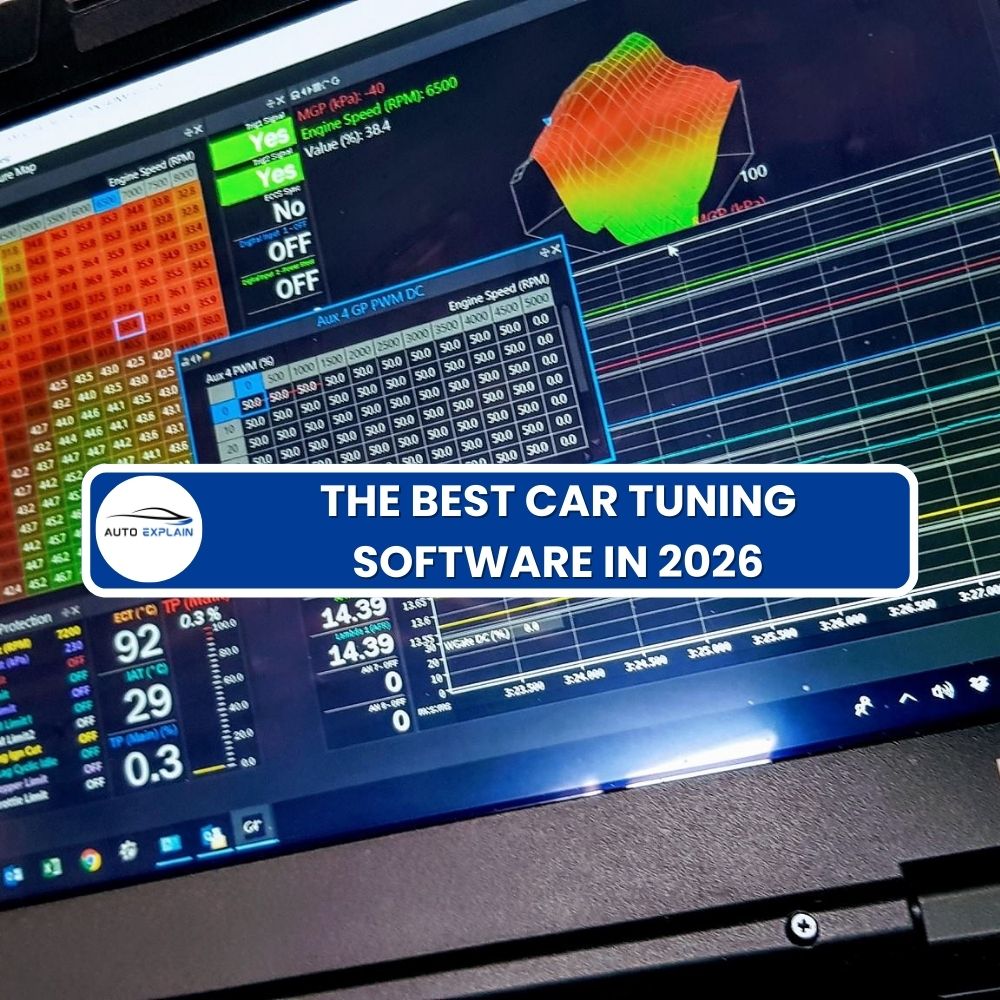
The Best Car Tuning Software in 2026: A Comprehensive Guide for Professionals




